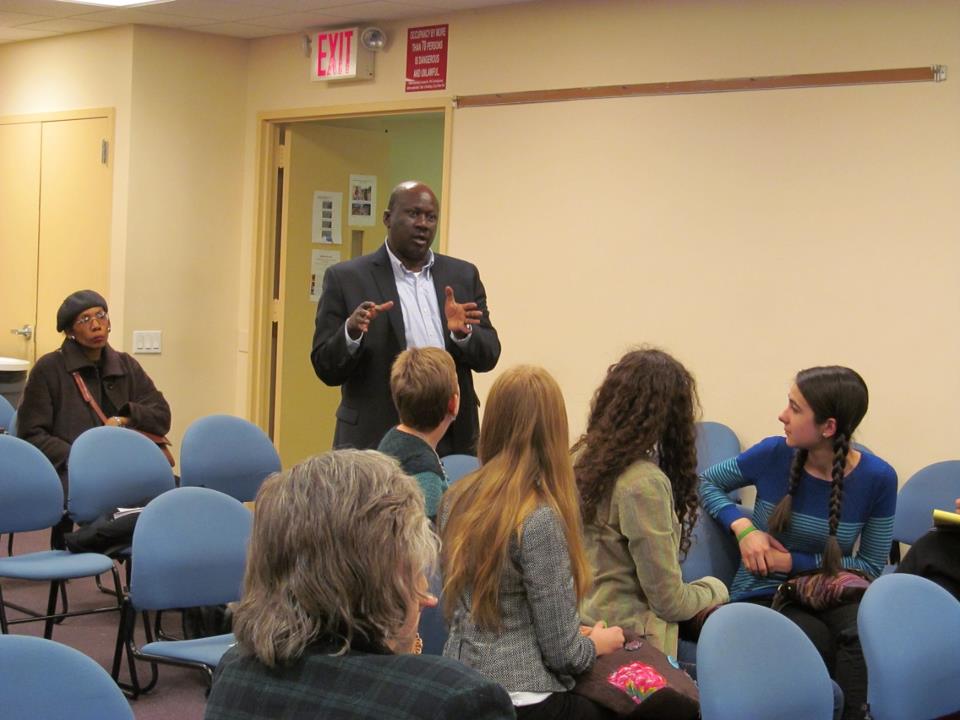Sudan: Africa Talks Interviews Ahmed H. Adam
Ten Years After the World Woke Up to Darfur, What has Changed?

Sudan: Africa Talks Interviews Ahmed H. Adam
Ten Years After the World Woke Up to Darfur, What has Changed?
Africa Talks: A conversation with Ahmed Hussein Adam
In a phone interview, Africa Talks caught up with Ahmed H. Adam, a visiting scholar at Columbia University’s Institute for the Study of Human Rights.
To learn more about Ahmed H. Adam, you can click here. Here’s a brief biography adapted from information on the school’s website:
Born in 1968 in Darfur, Mr. Adam studied law in Khartoum in 1996 and subsequently received an LLM in International law in 1999, from the Westminster University, in London. Mr. Adam represents the people of Darfur in peace negotiations with the government of Sudanese President Omar Al-Bashir. Mr. Adam is also the official spokesperson of Darfur’s armed and political group, the Justice and Equality Movement (JEM), where he manages the public relations and media outreach.

Part I: Issues discussed during phone interview:
It’s been almost ten years since the world became aware of the Darfur war and I would like to know your perspective about what life is like for people in Darfur today?
…the humanitarian situation is getting worse and worse…security situation is very bad, air bombardments against the civilian population and their livestock, the militias are killing people…rape cases in the IDP camps have increased…Darfur is like a black box, nobody is talking about it
The man who is indicted by the International Criminal Court with charges of genocide, crimes against humanity and other war crimes [Omar Al-Bashir] is still not held responsible. I want to pick your brain about what credibility the court and the international community have after this and what precedent is that setting for other similar cases?
…The international community and the International Criminal Court are setting a very dangerous precedent…Darfur is a case of failure of the international community, in many aspects, in humanitarian aspect and in security aspect …other violators of human rights, a lot of them right now, they can do a lot of things without being actually held accountable by the ICC.
Do you think the answer to hold rogue leaders to account is by adding sanctions and putting more pressure? How would that cause Bashir to go along with the request of the international community?
…Sanctions are not robust but if the international community has the political will, I think they have a lot to do…if they want to be really serious about Sudan…and send a strong message to other human rights violators around the world that impunity is not tolerated in the world.
In fact, you have written extensively about how how shunning Bashir has pushed him to align with nations such as Iran and is being used as a launching point for Iranian military and intelligence operations. Can you expand on that? (You can read Mr. Adam’s article here).
right now, Bashir is developing a very serious and dangerous alliance and coalition with Iran and that’s not only against the people of Sudan but also against the international community…and because Bashir is feeling isolated, Sudan is becoming a dangerous military and intelligence base for the Iranian Revolutionary Guard…Sudanese are very peaceful people, they don’t want their country to be a battlefield for regional and international powers or forces…the Iranian alliance of Bashir is not an alliance for the people of Sudan. It is an allaiance for Bashir’s survival and it is going to make Sudan a haven for international terrorism…Iranians are not there for prosperity or supporting the people but to support Bashir with a military machine to kill his own people and beyond.

Part II: Issues discussed during phone interview:
There have been reports of student revolts and an attempted coup. How stable do you think the regime is? Is there change coming from within?
coup leaders were regime supporters…right now the regime is so weak, it is shaking…but they are not looking for reforms, they are trying to continue the same kind of politics…However, the civil society in the country can bring positive change…
I would like to talk about recent agreements between South Sudan and Sudan to continue oil exports. As recently as Sunday, South Sudan has started removing thousands of its military out of a buffer zone. Do you think such mutually beneficial economic agreements would bring eventual peace between the two nations despite disagreement about Abyei?
…after any agreement, we hear about violations to the agreements. I’m very pessimistic about what is going to happen. In order to make peace, we have to be really cautious because this has to do with Bashir’s strategy…I know that the international community is behind negotiations but what percentage has been achieved? The regime is divided…we are not speaking about a coherent regime that is committed to any kind of agreement.
If you had to look into the future of Sudan, what would you say?
…the people of Sudan deserve change, they deserve democratic change….what I dream is for Sudan to be a peaceful, democratic and prosperous nation but provided that Al-Bashir is not in power.










